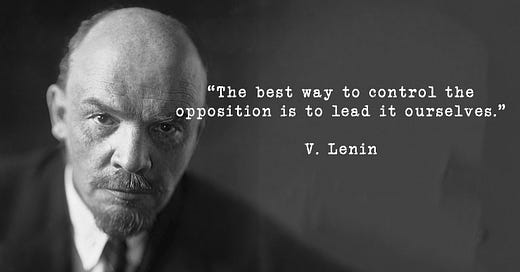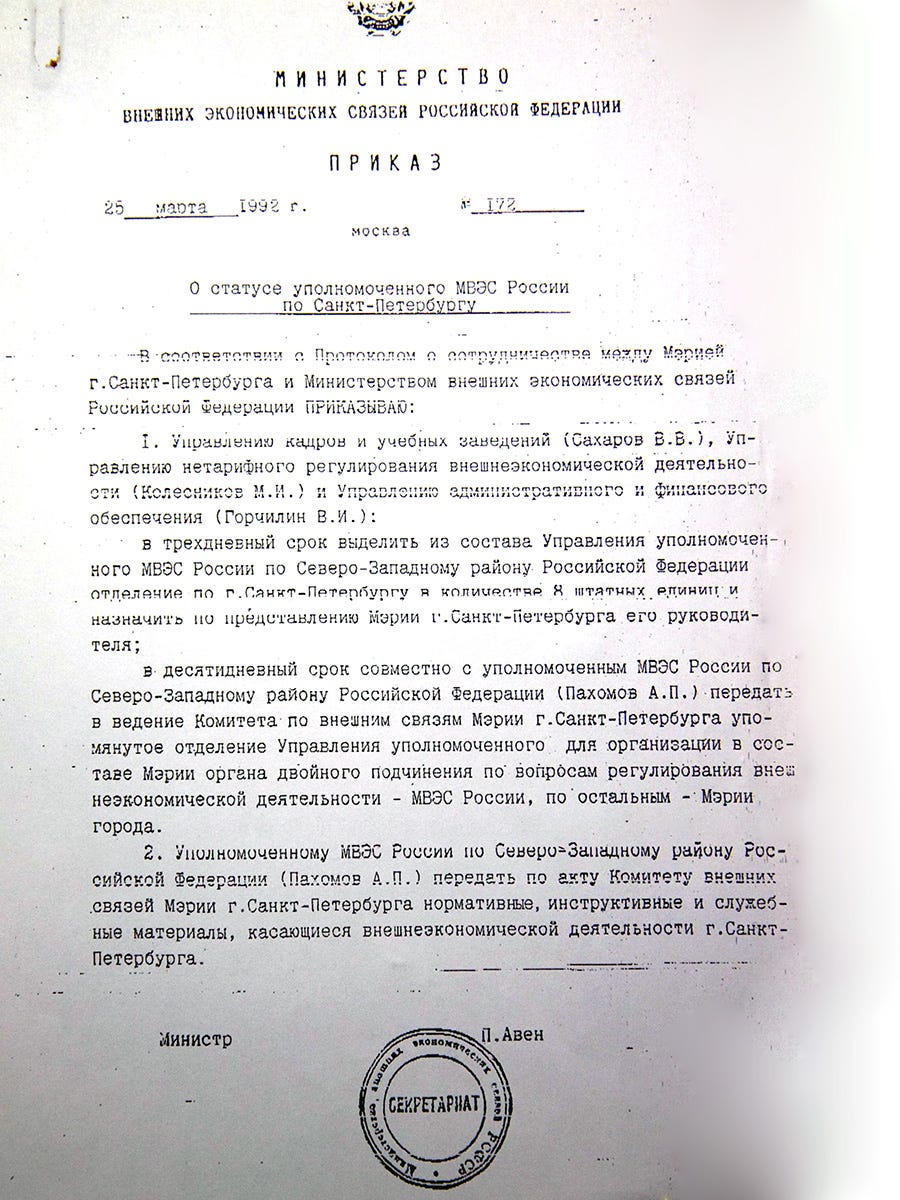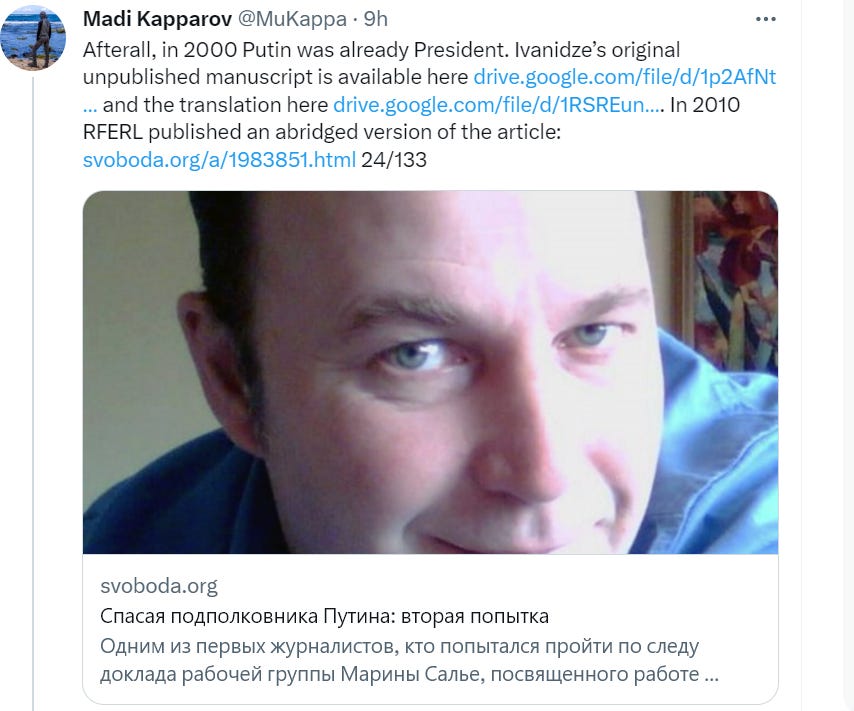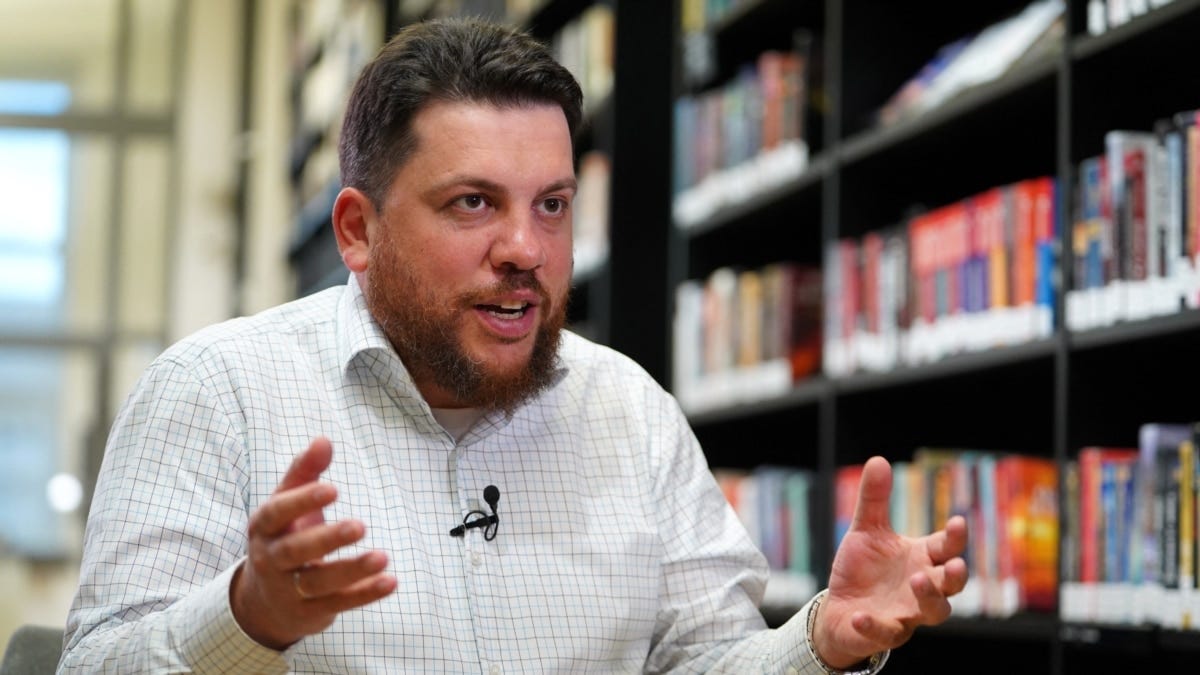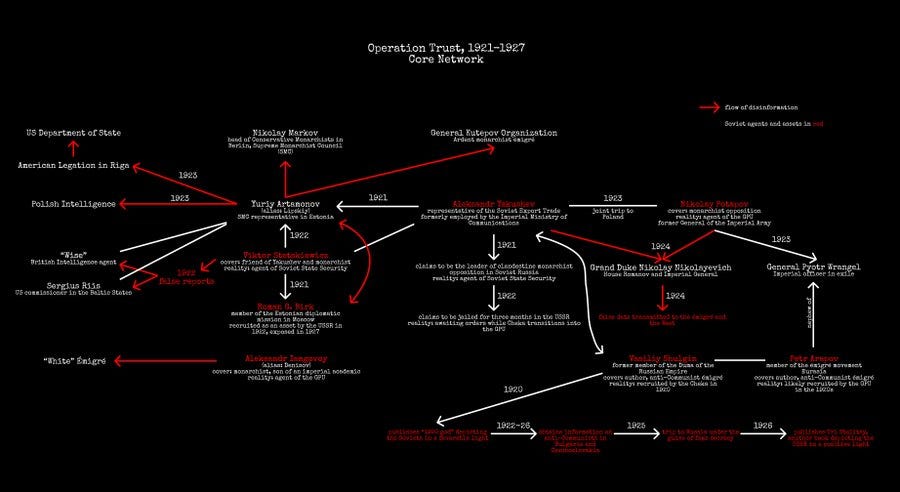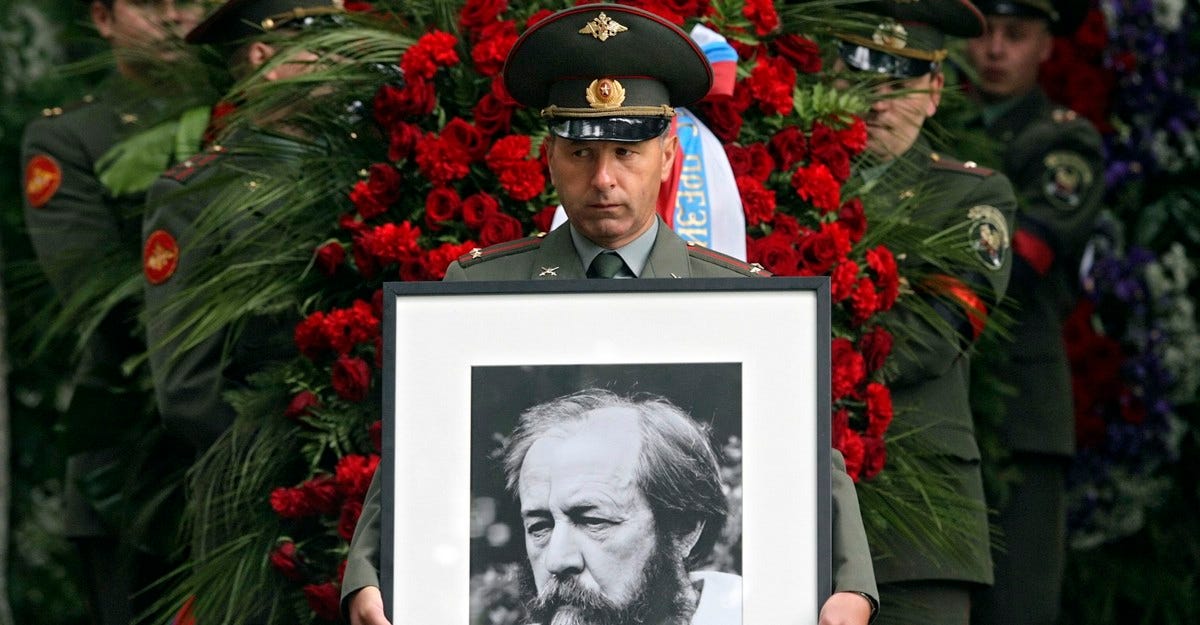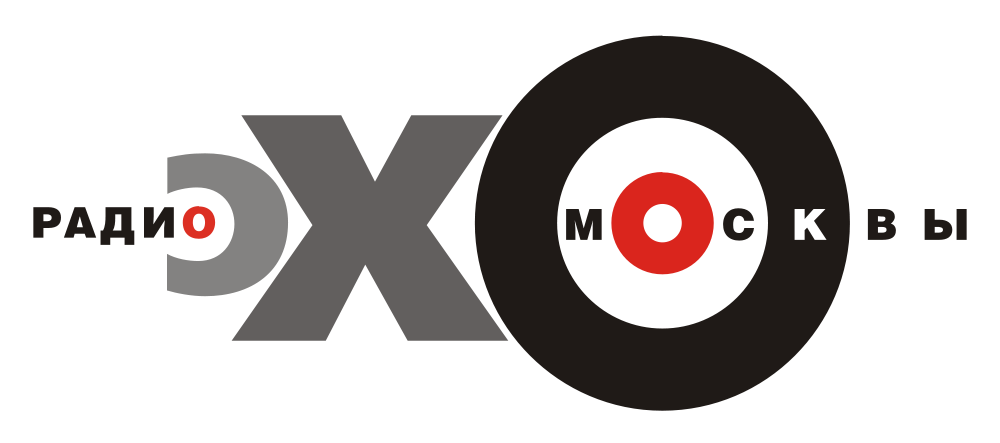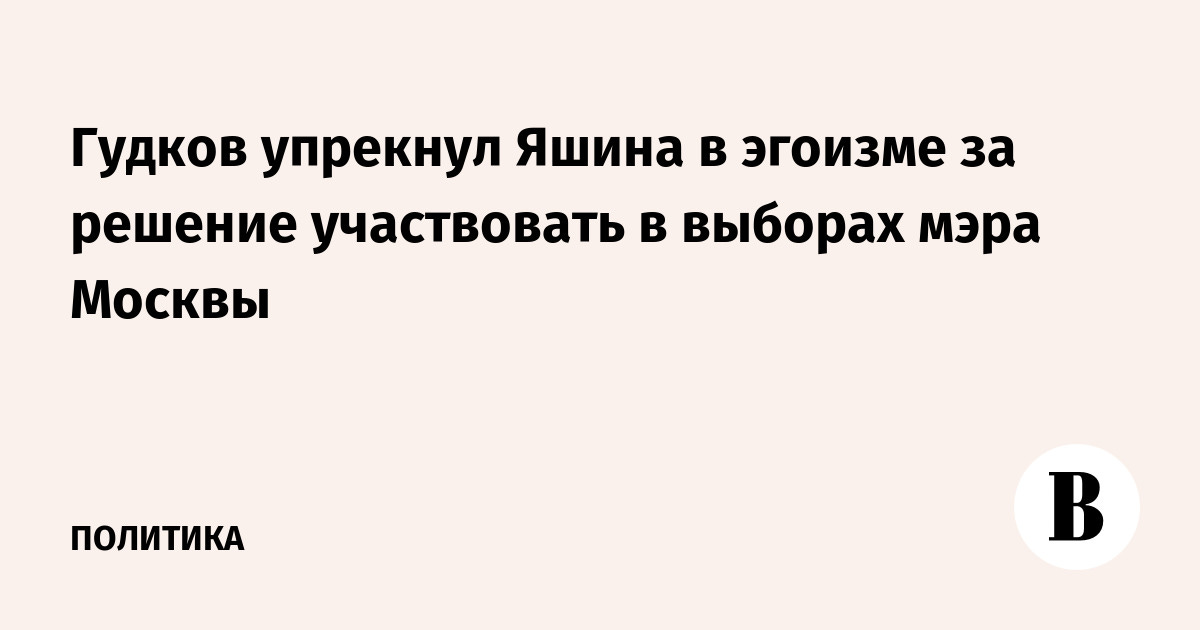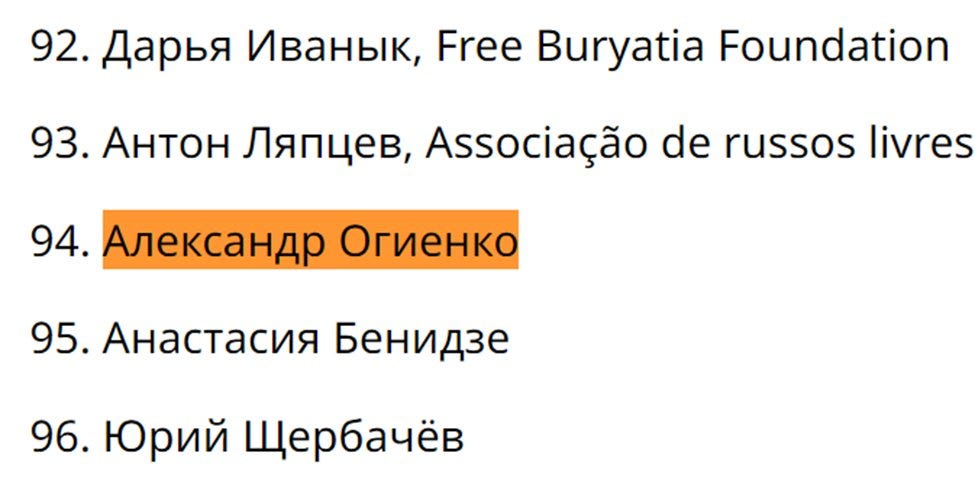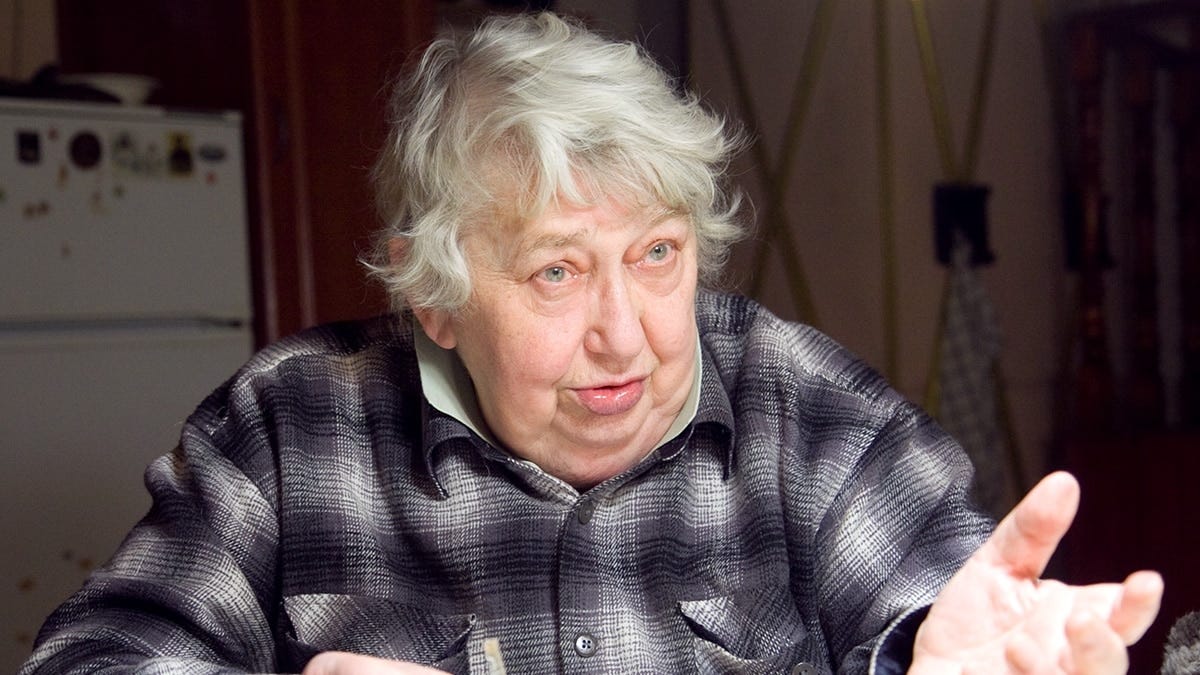May 25: Madi Kapparov, Russian “Opposition” and Western Supposition- the Persistence of Unfreedom
The persistence of Unfreedom- Thread published on May 25, 2023
Madi Kapparov, Russian “Opposition” and Western Supposition—the Persistence of Unfreedom
First things first, is there opposition in Russia? Yes, there is. But not the kind one might expect.


This thread will only scratch the surface looking into the past, analyzing the present, and pointing out the caveats of working with the opposition in Russia.
On February 7, 2023, Leonid Volkov, chairman of Navalny’s Anti-Corruption Foundation, pleaded in a petition with the European Commission to lift sanctions from Alfa Group, one of the largest Russian financial institutions.
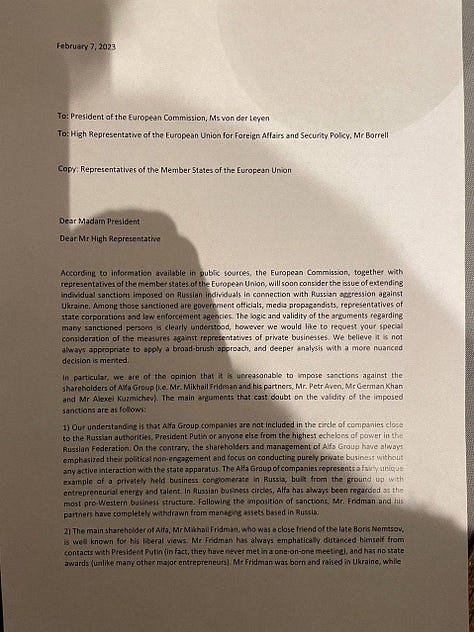


Signatories of the petition included the founders of TV Rain, Sindeeva and Krichevskaya, the former Deputy Prime Minister of Russia, Alfred Koch, some prominent Russian journalists, and others.
They argued that Alfa Group was unaffiliated with the regime and the “main shareholder” Mikhail Fridman was “a close friend” of the late Boris Nemtsov and was of a Ukrainian origin.
The letter conveniently ignored Alfa Group’s history of corporate raiding and the other “main shareholder,” Petr Aven. Fridman and Aven were looking to sell Alfa Group and at the time of writing they are still looking for buyers.
The sanctions imposed on Alfa Group introduce a significant discount on the potential sale price and having the sanctions lifted would enrich Fridman and Aven by billions.
So why would Volkov et al. pen such a bold petition? The answer lies in Aven’s, not Fridman’s, past.
Aven saved Putin from a criminal investigation in 1992. Putin owes Aven a favor. In 2000 Vladimir Ivanidze, head investigative journalist of Vedomosti, interviewed Marina Salye who was a St. Petersburg city council deputy in the early 1990s.
That interview started a thorough investigation into Putin’s activities in 1991 and 1992 in St. Petersburg where he worked as a head of the city’s Committee for Foreign Relations.
One of his chief responsibilities was to ensure that the city’s food supply was adequate as the collapse of the Soviet Union introduced severe shortages throughout Russia.
To fulfil his primary objective Putin started issuing trade licenses in 1991 to exporting firms in Russia to barter natural resources for produce. Cosmetically his activity seemed legitimate.
However, only regional special commissioners of the Ministry of External Economic Relations could issue such licenses. Moreover, Putin issued such licenses only to select companies that were affiliated with him or his boss Anatoly Sobchak, mayor of St. Petersburg.
The corrupt schemes were elaborate and even involved the St. Petersburg office of the Red Cross.

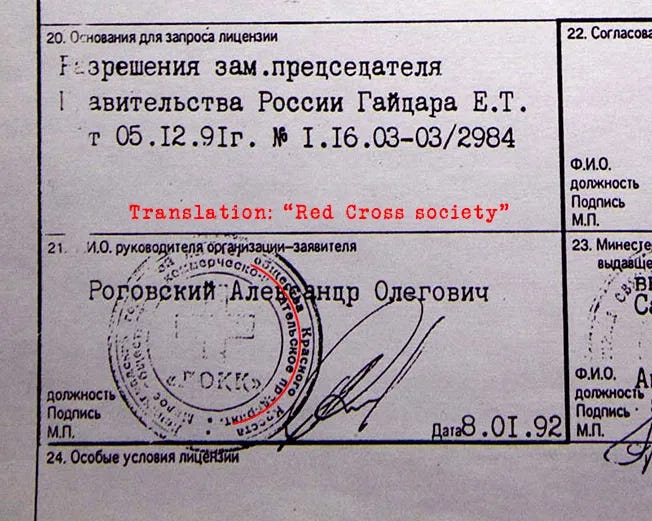
Putin was appointed chairman of the St. Petersburg Committee for Foreign Relations in the summer of 1991 and shortly after he and his deputy, Anikin, started issuing trade licenses.
However, as they were doing so in violation of the federal regulations, Putin decided to secure his position by writing a letter to Aven, at the time Minister of External Economic Relations (MVES), on December 4, 1991.
On January 15, 1992, Yegor Gaidar, First Vice-Premier of the Federal Government, sent a decree to the head of Customs Services, Kruglov, stating that export licenses issued by only the MVES or their special commissioners were legal.
Kruglov passed on the decree to the head of St. Petersburg Customs, Stepanov. Stepanov noticed the violations by Putin and his associates rather quickly and notified Moscow.
To make matters worse the required produce never came in January 1992.
This prompted an investigation by a committee of deputies of the St. Petersburg city council led by Marina Salye.
The investigation uncovered that all contracts signed by Putin and Anikin significantly deflated prices of exported natural resources below market prices, in some cases as much as 2,000-fold. The difference was likely pocketed by Putin, Sobchak, and their associates.
Neither Salye nor Ivanidze provide precise estimates of how much was stolen, yet from the documentation that is publicly available I estimated a sum of at least $50 million.
The investigation by Salye’s committee was suppressed before their work could be completed.
The committee did recommend Putin’s dismissal and made him a subject for a potential criminal investigation. On January 9, 1992, Gaidar issued a resolution approving export licensing activity by Putin’s Committee.
However, then Gaidar’s decree of January 15 to the Federal Customs Service makes little sense. Hence, the January 9 resolution was likely backdated. Ivanidze suggests that Aven pressured Gaidar into issuing the resolution.
Furthermore, Aven appointed Putin as his Ministry’s special commissioner in St. Petersburg granting Putin rights to issue export licenses on March 25, 1992.
Ivanidze’s investigation was never published by Vedomosti. In fact, he was later fired from the paper.
Afterall, in 2000 Putin was already President. Ivanidze’s original unpublished manuscript is available here drive.google.com/file/d/1p2AfNt… and the translation here drive.google.com/file/d/1RSREun….
In 2010 RFERL published an abridged version of the article: svoboda.org/a/1983851.html
Saving Lieutenant Colonel Putin.pdf
https://drive.google.com/file/d/1p2AfNtS9bagZl_iGJUXORT2NJBzs7RBt/view?usp=share_link
Saving_Lieutenant_Colonel_Putin_[eng].pdf
https://drive.google.com/file/d/1RSREunXYUZXj2TGa4BUimY96djo4QYPC/view?usp=share_link
So, were Volkov et al. suggested by someone from the Kremlin to petition on behalf of Alfa Group, so that Putin could return the favor to Aven for his salvation in 1992?
Volkov “paused” his activities as chairman of Navalny’s Anti-Corruption Foundation on March 9, 2023.
Similar questions emerge quite frequently with the Russian “liberal” or “extra-systemic” opposition. The opposition in Russia is largely divided into two categories. First is the systemic opposition.
Those are the parties other than United Russia that hold seats in the State Duma: KPRF (communists), LDPR (ultra-right-wing), A Just Russia and New People (“moderates”).
Systemic opposition in Russia is only opposition in name and exists for appearances’ sake and for the illusion of choice. Second is the extra-systemic opposition.
They are generally associated with such names as Navalny, Kasparov, Kara-Murza, Ponomarev, Yashin, etc. Some months ago, I discussed Navalny ad nauseum:
However, this thread is not about specific names but rather the opposition as a phenomenon in Russia. Before we get into the present day, we need to take a history walk and look at a few select episodes in the history of the USSR and Russia.
Let’s go back to 1921.
The “Russian Civil War” had just ended, and the Reds emerged victorious. But many prominent Russian monarchists survived and fled communist Russia posing a threat to the new communist regime.
Moscow launched Operation Trust not only to tackle the monarchists but also to prevent Western interference in power consolidation by the new regime.
Soviet intelligence services created a network of fake monarchists and anti-communists to expose and neutralize those working against the new authorities in Moscow while keeping Western intelligence disinformed.
It was achieved by recruiting former Russian imperial officers or public servants for credibility.
Two such agents, Yakushev and Potapov, managed to feed disinformation packages to Grand Duke Nikolay Romanov, the Supreme Monarchist Council, British and Polish intelligence, and the US Department of State.
A summary report on operation Trust is available here: cia.gov/readingroom/do…. An updated and more readable version of the report is in Natalie Grant’s (Wraga’s) book “Disinformation” recommended to me by @MoniqueCamarra. I created a chart of the core network of the Trust if you ever end up reading the report.
op_trust_network.pnghttps://drive.google.com/file/d/1vXM9sXZFGo2gMC7cV7GedTXb2fnTMSKC/view?usp=share_link
Grant writes: “Trust agents supplied the West with false material especially produced in the counterintelligence department of the GPU [NKDV’s preceding agency], a branch of the Soviet Government which has the wherewithal to combine truth and invention into one indistinguishable package. Because the data sounded plausible (since it contained some truth), the information compiled by the GPU impressed the target as genuine and the persons who supplied the material enjoyed absolute confidence.”
To prevent Western interference and make the West believe that the Soviet authorities were not a threat, the Soviets supplied them with false reports on the domestic situation within Russia.
First, they created their opposition, the monarchists, calling them “the only anti-Soviet party in Russia which counts.”
Second, they fabricated events and activities in which the “monarchists” took part, reporting on fictitious monarchist conferences in Moscow and the creation of monarchist cells “all over Russia.”
Using the channels of engineered opposition during operation Trust, the Soviets “exerted constant effort to divert attention from serious problems facing the Communist regime, which if developed could have endangered the Soviet Government, and to focus the spotlight secondary issues. Major difficulties were screened from the West and unimportant factors emphasized. In this fashion, the outside world saw Soviet Russia in a distorted mirror which warped analysis of the Soviet problem.
These errors in turn led non-communist countries to take action harmful to their own interests and favorable to the development of Communism on the local, national, and international level.”
Operation Trust ended in 1927. Public records do not provide a definitive answer as to why former imperial officers and government officials, like Yakushev, decided to work for the Soviets.
However, I speculate that given that the Reds managed to mostly preserve the territorial integrity of the Russian Empire, Yakushev and many others simply viewed the USSR for what it truly was – a continuation of the Russian Empire under new management.
They continued to serve Russia.
The methods of controlling the moods and narratives of those who could a pose threat to the regime continued during the Cold War.
It is claimed that almost half of Soviet dissidents fleeing the USSR were in fact KGB spies (cia.gov/readingroom/do… cia.gov/readingroom/do…).
However, the most peculiar case is that of Andrei Sakharov. He was the key figure in the Soviet nuclear weapons program and was the creator of the first Soviet thermonuclear bomb.
For his contributions to the development of weapons and nuclear technology he was awarded the highest civilian decoration in the USSR, Hero of Socialist Labor, three times. However, following the 1962 Cuban Missile Crisis, he turned to activism.
He started advocating against nuclear proliferation. After the 1967 Glassboro Summit Conference where the US offered the USSR a bilateral rejection of the development of antiballistic missile defense Sakharov advocated in favor of the proposal.
Sakharov argued that the treaty proposed by the US helped avoid an arms race, something the USSR’s economy could ill afford as Khrushchev’s programs had little success.
In the 1970s Sakharov pivoted to human rights activism.
In 1972 Sakharov and his associates came under attack by the authorities and Soviet scientific community. Pyotr Yakir and Viktor Krasin, Sakharov’s associates and fellow dissidents, were arrested by the KGB.
Two decided to cooperate with the KGB giving up the names of fellow dissidents and receiving shortened sentences in exchange. Sakharov miraculously avoided the arrest and the dissident periodical started getting published again 18 months later.
The periodical’s narrative shifted however – political reforms within the USSR were no longer discussed.
Sakharov is still considered to be a dissident hero. However, his immunity and timing of his narrative shifts raises some questions.
Moreover, in 1972 Aleksandr Solzhenitsyn came to Sakharov’s defense. The two created a pair that covered all the dissident bases with the intelligentsia in the USSR: Sakharov – the pragmatic scientist and Solzhenitsyn – the Russian traditionalist, the mystic and wordsmith.
Solzhenitsyn’s nature was laid bare in 1990 when he expressed his deep sorrow of over the dying Soviet, albeit Russian, Empire.
Moreover, Sakharov himself was a Russian chauvinist, disliked working with ethnic minorities, and was a proponent of Russification of Soviet academia. My source is a late relative who was a Soviet academic and had the (dis)pleasure of encountering Sakharov in Moscow.
Perhaps one day we will have a definitive answer on Sakharov’s and Solzhenitsyn’s true roles. Before you ask, no, “The KGB File of Andrei Sakharov” by Rubenstein et al. is not based on the complete KGB record on Sakharov. Most of the KGB documentation on Sakharov was destroyed in 1988 and 1989.
In 1986 with Gorbachev’s glasnost and perestroika Sakharov started gaining popularity with the masses domestically within the USSR.
In 1989 Sakharov was elected to the newly formed Congress of People’s Deputies, the USSR’s Parliament. Gorbachev, in an attempt to save the ailing Soviet Union, launched glasnost and perestroika to address the accumulated systemic issues within the country.
While perestroika was aimed to fix the economic issues, glasnost was an initiative for openness and transparency, democratization of the Soviet Union. However, how does one create a democracy where there was none, ever?
Gorbachev opted for a shortcut – a façade of democracy as a show for the outside world. Candidates running for the new Soviet Parliament still required pre-approval from the KGB.
The West frequently forgets how Gorbachev violently crushed pro-democracy protests across the republics of the USSR in the final years of the Soviet Empire.
There was another People’s Deputy who is worth noting – Vladimir Zhirinovsky.
Some of you mind remember him as a flamboyant ultra-nationalist within the Russian State Duma, a court jester who would be frequently used by Putin’s regime to test most extreme ideas for public reception. However, Zhirinovsky’s political career started in the USSR.
While Sakharov’s party, Inter-Regional Deputies Group, covered the liberal part of the political spectrum, Zhirinovsky’s Liberal Democratic Party of the Soviet Union (LDPSS) was liberal in name only and covered the conservative part of spectrum promoting Russian nationalism and imperialism. The LDPSS was established in 1989 and at the beginning of 1990 had only 13 members. By the 1990 Parliamentary elections the LDPSS has 3,000 members and in the runup to the elections received broad coverage across the Union.
Unsurprisingly the LDPSS secured seats in the Soviet Parliament. The party advocated against greater independence from Moscow by the constituent republics, such as Ukraine.
In contemporary Russia, Zhirinovsky’s work for the KGB is an open secret. His candidacy was approved by the Soviet security services and his meteoric rise in 1989 and 1990 has few other explanations. The rumors of him being a KGB agent started circulating even in 1989 but he denied everything.
However, at the time he was pitched to the West as a dissident and opposition to the Soviet authorities. Not everyone bought the story.
In a meeting with the US Ambassador Deputy Chancellor of Austria Erhard Busek commented that “Zhirinovsky’s nationalistic and imperialistic comments were not unique to him.
He [Zhirinovsky] was saying what many intellectuals and dissidents were saying (e.g., Ukraine is part of Russia). The West was shortsighted, Busek said, to concentrate on Yeltsin and Moscow. Our judgement of Russia was wrong.
Russia was Russia, Busek stressed, and Russian aims have remained unchanged since the Tsars. Russians were educated to think in imperialistic terms – warm-water ports, empire running south to the Indian ocean, etc”.
It does not help Zhirinovsky’s case that he sided with the Communist hardliners during the 1991 August coup.
After the collapse of the Soviet Union the LDPSS was reformed into the LDPR, which is part of Russia’s “systemic opposition” as explained earlier.
Our history walk ends here for brevity’s sake. However, any sincere opposition attempts in contemporary Russia were crushed in the 1993 Constitutional Crisis. Everything that followed was a show for domestic and foreign audiences.
But how can it be? There are so many names among the ranks of the Russian “liberal opposition.” Contemporary Russia picked up where the Soviet Union had left off.
As part of glasnost, the USSR founded a liberal radio station, Echo of Moscow in 1990.
Two of the original four shareholders of the radio station were the Moscow City Council of People’s Deputies and the Moscow State University.
Something worth noting: Garry Kasparov was a shareholder of the radio station in the 90s. Following the fall of the USSR, Russia continued funding Echo of Moscow.
In the early 2000s Gazprom, Russia’s main state-owned oil and gas company, acquired the majority share in the radio station.
However, despite the obvious money trail from the Russian Federal Government to the station, Echo of Moscow has been considered a “liberal opposition media outlet.”
Such questionable money trails are not limited to Echo.
I discussed earlier the history of TV Rain, another Russian “liberal media” (Unroll available on Thread Reader). Part of TV Rain’s funding indirectly came from the Russian Railroads and directly from the Russian Federal Agency for Press and Mass Communications.
According to an investigation by “Proekt,” Novaya Gazeta’s goal is “to create an illusion of political freedoms and of the freedom of speech” in Russia.
However, it would seem that the plan had also worked abroad: the 2021 Nobel Peace Prize was awarded to Novaya Gazeta’s Editor in Chief, Dmitry Muratov.
All three outlets, Echo, TV Rain, and Novaya Gazeta were forced to suspend their operations in Russia following the start of the full-scale invasion of Ukraine by Russia as part of the Kremlin’s move to consolidate the info space.
Why should one focus on funding when analyzing a political movement or a media outlet? Because money speaks louder than words in politics – to have any relevance a large “marketing” campaign is required.
That is why the lack of transparency of funding of Navalny’s Anti-Corruption Foundation and other major Russian liberal opposition figures is bothersome.
I will not speculate that a Trust like operation is underway with the Russian liberal opposition, however, they were useful to the Kremlin on many occasions.
In what way?
It is easier to categorize their activities that were beneficial to the Kremlin than to go through the chronological list of their actions:
1. Vote splitting – is perhaps one of the most widespread practices worldwide and is utilized in Russia as well.
For instance, in the 2018 mayoral elections in Moscow, Dmitry Gudkov was supposed to run as a unified candidate from the “extra-systemic opposition” against the incumbent Sobyanin and candidates from the “systemic opposition.”
However, Ilya Yashin announced his decision to run after the decision had been made on D. Gudkov candidacy by the coalition of “extra-systemic opposition”.
Unsurprisingly neither Gudkov nor Yashin won the election and with the vote splitting it is likely that no vote counting machinations were necessary for Sobyanin.
2.Civil discontent release valve – while there is something happening and somebody appears to be doing something for the social good, an average citizen is tempted to free-ride and remains content.
The grandest scale example of such pressure release valve are the Bolotnaya Square events of May 6, 2012, a day ahead of Putin’s inauguration.
So, Moscow did not mind having a large crowd led by the “liberal opposition” the day before Putin’s inauguration. The exact number of people that attended the protest is unknown but is estimated at 30,000 to 60,000. Following the event, 35 people were arrested.
Perhaps the most prominent names of those who were arrested are Mariya Baronova, a journalist who later worked for Russia Today (!) and was a member of Khodorkovsky’s Open Russia, and Natalya Pelevina, a Russian politician, human rights activist, and blogger for Echo of Moscow.
A less grand but more bizarre example of a civil discontent release valve is the case of a Yakut shaman, Aleksandr Gabyshev.
He never made it to Moscow as he was put into a mental hospital before he could finish his journey. It did make for a great show for the masses and the Kremlin allowed it for a while.
3.Signaling the Kremlin’s attitudes to the members of the system – some Russian liberal opposition figures tend to focus on less significant actors within the Russian government system sometimes.
For instance, in 2019 Navalny’s Anti-Corruption Foundation criticized the governor of the Kamchatka Krai, Ilyuhin. In 2020 the governor left his post.
Volkov of ACF practically built his reputation as a “liberal opposition” figure primarily criticizing regional authorities.
4.Detecting potentially dangerous actors to the regime – much like with operation Trust and other Soviet operations discussed by Grant, detecting significant threats to the regime is of an utmost priority and can be done using actors masquerading as opposition for infiltration purposes. Such threats need to be identified, discredited, and neutralized. The most vivid example is the assassination of Boris Nemtsov on February 27, 2015.
Following the Russian invasion of Ukraine in 2014 (Unroll available on Thread Reader) Nemtsov started an investigation into the extent of Russian involvement in the war.
Some “liberal opposition” figures knew of his plans – following his death it was reported that Nemtsov had intended to publish the results of his investigation.
5.Disinformation and propaganda for domestic and foreign audiences – if you are following the Russian invasion of Ukraine right now, it is likely you do not even need any examples.
In case you don’t: the central narrative promoted by the majority of the Russian liberal opposition is over exaggeration of Putin’s powers, elevating him to the status of “God of Russia.”
Some take a reductionist approach of blaming corruption alone, ignoring the fact that Russia’s economy is structured at the federal level in a way to keep the regions poor and Moscow rich (Unroll available on Thread Reader).
I won’t point fingers, but some of them are audacious enough to put the blame squarely on the ethnic minorities of Russia for the war crimes in Ukraine while whitewashing ethnic Russians, e.g. “only Buryats in Bucha”.
A more minor example would be the case of Marina Ovsyannikova who is still perceived to be a hero by some.
Let me remind you that her “act of civil disobedience” on the Russian state TV where she worked for many years was a farce – while in “exile” she asked for sanctions to be lifted.
6.Wasting time and resources of the West – I think it is safe to say that whatever resources were provided in 1990s and early 2000s to the Russian opposition movements following the collapse the USSR to promote democracy were wasted.
To round off this overview it is also necessary to point out that many of the prominent members of the Russian “liberation opposition” were part of the system before and worked for the Russian Government either at the federal or regional level.
I do not have a comprehensive list of all the members the Russian “liberal opposition”, but I used the list of signatories of the May 1, 2023 declaration they posted on change(.)org.
N.B. Aleksandr Ogienko liked the declaration so much, he signed it twice.
I also added key members of Navalny’s Anti-Corruption Foundation to the list.
The full list of names and affiliations is available here:
Of the 108 members of the Russian “liberation opposition” seven were State Duma Deputies or Senators. To even take part in an election into the State Duman a candidate needs an approval from the Russian Ministry of Justice and the Federal Protective Service (FSO).
Thus, these seven people were previously cleared by the Russian intelligence. 19 have experience working for the municipal or regional government, etc.
Of the 108 names only 31 people had no affiliations with the Russian government, state owned enterprise, state-supported or funded media, and no fascist views. That’s only 28.7%. And it only takes a few to undermine everything.
It is hard to predict what future awaits the Russian opposition. However, while the existing federal structures are in place, it is extremely unlikely that there can be any democratization in Russia.
Ever since 1991 the Russian “extra-systemic” opposition has been failing spectacularly, either by design or incompetence.
What is clear is that Russia cannot even have hopes of democratic prospects until the rule of law is restored, which means that the independence referenda of the 1990s in Chechnya and Tatarstan need to be recognized.
The centralization of power in Moscow needs to be disrupted.
Given that federalization in Russia was done through corruption, coercion, or an outright genocidal war, as it is the case with Chechnya, the Russia needs hold democratic referenda in the autonomous republics and other regions where the population could finally gain their agency by choosing a) complete independence, b) federalization on more favorable terms, c) remaining in the federation as it is.
However, such referenda would need to be conducted only a few years of an information campaign educating the regional population on how much they were robbed by the Central Federal District (Moscow).
While such an information campaign is underway Russia would also need to undergo lustration – those who were members of the old system, cannot take part in building the new system. That would include many current members of the “liberal oppositions.”
Do you still remember Marina Salye, the St. Petersburg city council deputy who investigated Putin’s corruption schemes in 1992? After giving an interview to Ivanidze she remained quiet for ten years. In 2010 RFERL took her final interview.
The interviewer asked Salye if there was any hope for the unification of opposition in Russia. Her response was short: “I don’t have such hopes. I think that Russia will simply fall apart into pieces.” Salye passed away in 2012.

